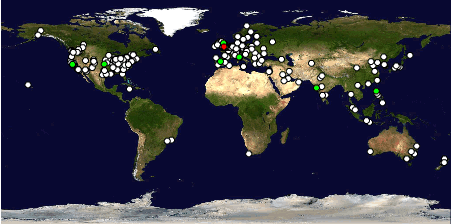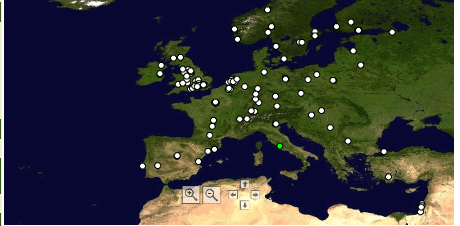December 30, 2005
How often does your mother say "butt"?
So asks Benson Smith, proposing a novel and interesting hypothesis that may shed new light on the contested origins of the phrase "butt naked":
Your post "new intensifiers" was linked recently from a German/English translation forum I like to read. I thought you might enjoy my pet theory:
1) in German, the word "aber" is used as an intensifier in the same way (es ist ABER kalt! = it's REALLY cold!)
2) "aber" is...wait for it...German for "but"
3) there have been a lot of German settlers in America, including, for example, Iowa
4) my mother, who is from Iowa, occasionally says "it is *but(t)* cold outside"
5) how often does your mother say "butt"?Conclusion: the expression was originally "but X" -- but cold, but ugly, etc. It comes from German settlers speaking English too literally. Naturally, native English speakers misinterpreted "but" as "butt", since "but" is not used as an intensifier in English.
Well, this morning Google does have 908 hits for {"butt cold"}. Unfortunately, Google Maps won't yet let us display an overlay of dots for the native region of the authors -- or even for the geographical location of the IP addresses of the sites, like these maps of recent Language Log visitors (produced by sitemeter, not by Google):


More seriously, one of the things I've come to realize about this sort of etymological discussion is that there may sometimes be more than one right answer. Ben Zimmer has promoted Alan Metcalf's five FUDGE factors for predicting the success of neologisms (Frequency of use, Unobtrusiveness, Diversity of users and situations, Generation of other forms and meanings, and Endurance of the concept), adding his own sixth factor Resistance to public backlash. This gives us FUDGER, and I don't see any graceful way to add another pronounceable letter (maybe fudgery?), so I'll give up on the acronymic theme, and just add my suggestion in plain prose.
Multiple sources, interpretations and resonances increase the fitness of a word or phrase. Regionalisms, archaisms, technical terms, substrate influences and euphemistic (or scatalogical) alternatives can all help. Whatever and whenever the earliest uses of "butt naked" and "buck naked" were, it seems clear that both have been around for a while, with plausible independent modes of interpretation, connected to some of the ordinary meanings of butt and buck. There might also have been some support from a calque representing common usage in German, the non-English language spoken by the largest number of immigrants to the U.S. over the course of its history. I haven't seen any real evidence for this theory -- with all due respect to Benson Smith's mother -- but evidence that the intensifier sense of butt has other roots is not necessarily evidence against his suggestion. And vice versa.
Posted by Mark Liberman at December 30, 2005 09:58 AM